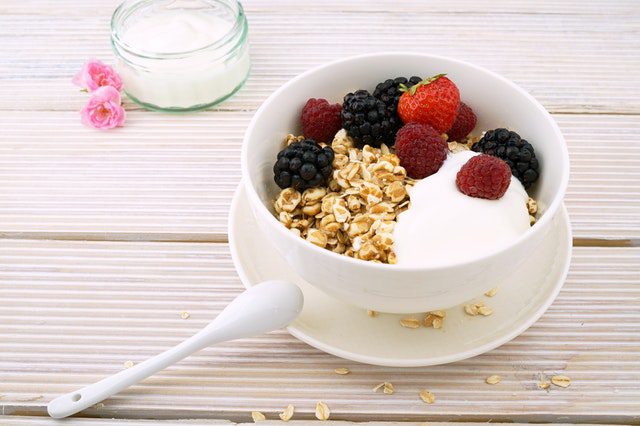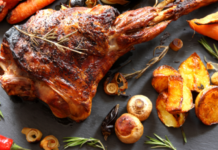Meet the Macros: Fitness experts reveal the best food groups for a muscle building diet
When it comes to gaining muscle (or losing fat), your diet should be treated like a high wire balancing act. Eat too little, and you’ll burn up your hard-earned muscle. Eat too much, and by the time you’re fully bulked, your new muscle will be hiding under a fat sweater. Use this guide to nail down your diet and ensure your endless hours in the gym are not wasted.
There are three macronutrients — proteins, carbs, and fats. Each one plays an important role in your muscle-building quest. Fitness expert Anthony O’Reilly from BarBend has revealed a breakdown of each of the three.
Protein
Protein is, without a doubt, the most important macronutrient for those looking to build muscle — and even for those looking to lose weight. As we stated previously, protein is the building block of muscle. Another benefit: protein speeds up the thermic effect of feeding, or the number of calories burnt through digestion. In other words, you’ll burn more calories — thereby keeping body fat down — just by eating protein (to an extent).
So that means you should go to the store and pick up everything that says “20 grams of protein” on it, right? Wrong.
First of all, it should be noted that not all proteins are created equally. Protein molecules are formed by amino acids, some of which are created in the body and some that need to be obtained through diet. The latter group is called essential amino acids (or EAAs), and there are nine of them, and each plays a vital role in your health and building muscle.
If you eat a typical Western diet, odds are you don’t have to worry about obtaining all your essential aminos. However, vegetarians and vegans should be a little more conscious. That’s because vegetable-based proteins, whether that be lentils or a Beyond Burger, lack all nine EAAs (the only exception to this are soybeans, which contain all nine).
To counter this, eat complementary amino acids. Beans, a good source of protein, lack the EAA methionine, which is present in rice and other grains. You can also supplement with BCAAs, or branched-chain amino acids, though you don’t want to rely on these supplements to get your full EAA allotment.
The Anabolic Window and Protein Timing
You’ve probably heard of the “anabolic window,” or the theory that there’s a limited amount of time where muscles can rapidly absorb protein and carbs following an intense workout, and thereby improve muscle growth. This is a popular urban legend among gym bros, but there’s limited proof that it’s real.
New studies have shown that the so-called “anabolic window” is only effective for dedicated bodybuilding athletes, so unless you’re dedicating your life to the sport, you don’t need to rush to down a protein shake after your workout.
Instead, pay attention to evenly distributing your protein intake throughout the day. Studies have shown this strategy has led to increased protein synthesis and improved body composition.
Best Protein Sources
Here are some protein sources recommended by the Cleveland Clinic:
- Edamame
- Lentils
- Split Peas
- Low-fat Meats (such as boneless, skinless chicken breast)
- Greek Yogurt
- Low-fat cottage cheese
- Canned Tuna
- Egg Whites
Carbohydrates
Carbs often get a bad rap, and there are many types of diets dedicated to helping you avoid them (ketogenic, carnivore, and Atkins, to name a few). When it comes to muscle-building, though, they’re an important part of your nutrition plan. Your body takes carbs and converts them to glucose, which is the body’s preferred energy source. Furthermore, your brain relies on glucose to carry out its daily functions — so it’s good for your mental and physical health.
Carbs also replenish glycogen, which provides energy to our muscles. Without glycogen, your biceps wouldn’t be able to hold up to repeated curls in the gym.
One of the reasons carbs have a bad reputation is that people don’t eat the right kind of carbs in most Western countries.
Studies have shown the quality of a macronutrient is vastly superior to how much of it you eat. This is easy to see when you consider white vs. whole-wheat bread — the former lacks the nutrient-dense germ of the grain.
Your carbohydrate sources should also contain plenty of fiber. Fiber can help you stay full throughout the day, so you’re less likely to succumb to unwanted cravings. To make sure you’re getting enough, aim to consume at least one gram of fiber for every five to 10 grams of carbs you consume.
Best Carb Sources
Here are some of the best sources of carbohydrates, as suggested by the Mayo Clinic:
- Barley
- Brown rice
- Buckwheat
- Bulgur (cracked wheat)
- Millet
- Oatmeal
- Popcorn
- Whole-wheat bread, pasta, or crackers
Fats
Fats are no stranger to controversy — the media and researchers change their minds on whether it’s bad or good every other year. “Egg yolks are good,” we’re told one day, and the next, we’re warned to stay away from them because of their fat content.
So why are fats necessary? As we stated before, they assist in hormonal functions. One study in The Journal of Urology linked low-fat diets to low testosterone counts in men. Testosterone is a necessary hormone for muscle growth.
You’ve probably heard some talk about “good fats” and “bad fats.” It can be a confusing topic, but here’s what you need to know: Limit your consumption of saturated and trans fats as these have been shown to increase your risk of heart disease and type 2 diabetes. Stick with monounsaturated and polyunsaturated fats, aka the kind of that have been shown to improve your overall health and provide nutrients essential for cellular function.
Best Fats Sources
Here are some examples of good fats, provided by the American Heart Association:
- Avocado
- Canola Oil
- Sesame Oil
- Sunflower Oil
- Albacore tuna
- Herring
- Lake trout
- Mackerel
- Sardines
- Salmon
- Almonds
- Hazelnuts
- Peanuts
- Pistachios
- Pumpkin seeds
- Sunflower seeds
- Walnuts
Vitamins and Minerals
There are too many vitamins and minerals that play a key role in your body for us to go over here, but it’s vital that you’re getting a good amount of vitamins and nutrients through your diet. Consult a nutritionist to ensure there are no deficiencies that could lead to injury, illness, or impaired recovery.
Further information can be found at https://barbend.com/how-to-gain-muscle/ who provided the expert commentary.
Help keep news FREE for our readers
Supporting your local community newspaper/online news outlet is crucial now more than ever. If you believe in independent journalism, then consider making a valuable contribution by making a one-time or monthly donation. We operate in rural areas where providing unbiased news can be challenging. Read More About Supporting The West Wales Chronicle

























